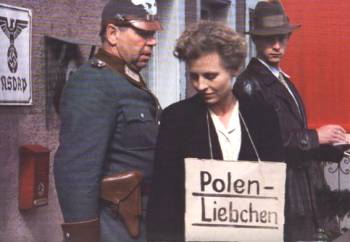 | ||||||||||
Eine Liebe in Deutschland [Love in Germany]
 fot: Renata Pajchel |
The true wartime events recorded by Rolf Hochhuth seemed to me to be perfect material for a film. The story of a Polish prisoner of war from the 1939 campaign working under police supervision in the small Bavarian town of Brombach, his love for a German woman, and his tragic end on the scaffold could be told on the screen without difficulty.
The excellent film theme gave me a chance to show on screen not only the collective past, but also the present of today's Germany. Especially since Paulina Kropp, described by Hochhuth, and condemned as "the Pole's slut"', was still alive at the time, though she had moved to another city. It was interesting that her immediate persecutor, a Nazi bureaucrat who had put the poor woman into a concentration camp for two years, had a house on the main street of Brombach, and lived there untroubled by anyone.
Unfortunately, the story barely indicated the plot and described it generally and briefly, using only selected details. I, meanwhile, was unable to reconstruct real life in a small German town during the war. I didn't know the realities, and had to resort to fiction.
The German audience sensed this unreality at once, which afforded them the opportunity to reject, with relief, the problems touched upon in the film. I'm not sure whether I wouldn't react in the same way to a film on a Polish subject made by Germans.
My Polish films were always images of a fate in which I myself had also participated. In those films I judged Poles as one of them û this was my right. At times, motivated by a sense of honour I even defended a lost Polish position; like a Japanese samurai, I was prepared to commit seppuku for it's sake. Unfortunately, when filming Love in Germany, I could not afford to be generous and was unable to see the German point view. As a result, even today I have the sensation that I had disembowelled my neighbour in defence of my own honour...
A ridiculous turn of things!
Andrzej Wajda
Reviews
At the Venice festival we Germans have new cause to complain. Direction-wise, Wajda's film plunges below any acceptable level, the script is awkward, instead of some kind of lucid analysis of the special conditions of those Nazi days we get chaos and incompetence, and the actors, dear God, are poorly directed.
Ruprecht Skasa-Weiss
"Stuttgarter Zeitung", Stuttgart, 10 October, 1983
The author, Rolf Hochhuth, hasn't enjoyed my particular sympathy: noble intentions and truth, pedantic, never too bright, and always boring. I was wrong.
His book tells a moving story which inspired Wajda to produce one of his most beautiful films. A film very uncomfortable for us, Germans. (...)
The nobility of passion is concealed not in the love story but in Wajda's style. It is a cruel reckoning not only with Nazi Germans, but with all that Teutonic foolishness, for which Poles had paid long before Nazism, and which continuously appeals to the "purity of German villages." The novels of Tolstoy and Dostojevsky contain description of such German caricatures. Wajda has taken the charm out of Nazism with its constant nightmares, showing that idiocy is universal and timeless.
Volker Schl÷ndorff
Statement for the French press, 1983
Oscar | Films | Theatre | Why Japan?
Favourites | Pictures gallery | About Wajda | Bibliography
Main Page | Search | Wersja polska
Copyright © 2000 Proszynski i S-ka SA. All rights reserved